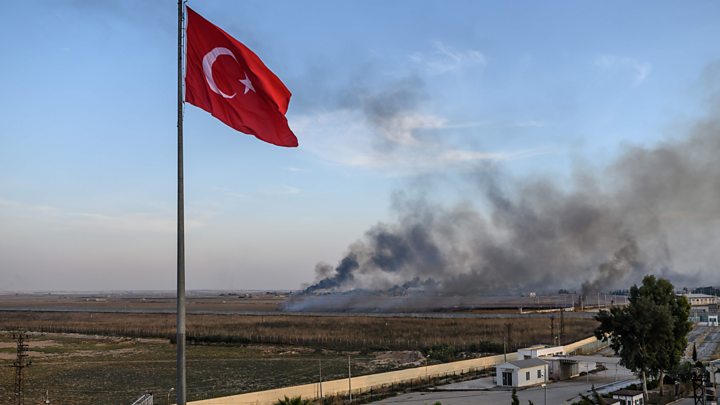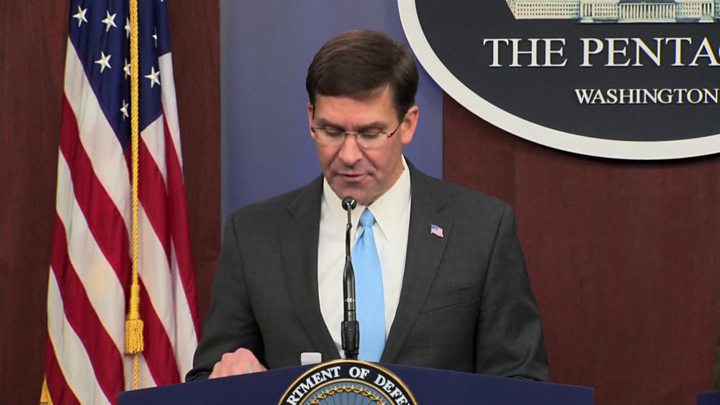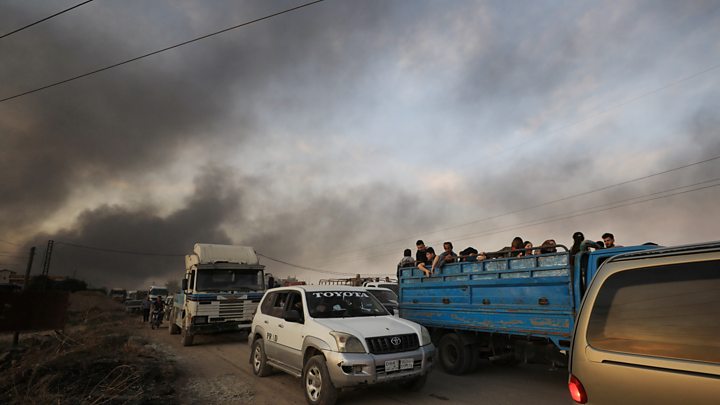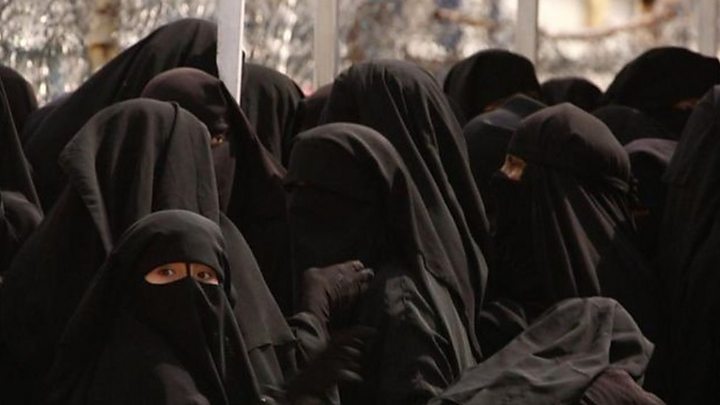Turkey Syria offensive: 100,000 flee homes as assault continues
The UN says thousands of people are sheltering in schools as pressure mounts on Turkey to halt the attack. …


Media playback is unsupported on your device
Some 100,000 people have fled their homes in north Syria, the UN reports, as Turkey presses on with its cross-border offensive on Kurdish-held areas.
Many people are sheltering in schools or other buildings in Hassakeh city and the town of Tal Tamer, the UN says.
Turkey took action on Wednesday after US President Donald Trump pulled American troops out of the area.
At least 11 civilians have died. Humanitarian groups say the number of people affected will rise further.
Dozens of fighters from the Kurdish-led Syrian Democratic Forces (SDF) and pro-Turkish factions have been killed. The first death of a Turkish soldier was confirmed by Turkey’s military.
Analysts say the US withdrawal in effect gave Turkey the green light to begin its cross-border assault.
Much of the region has been outside the control of the Syrian government as a consequence of the civil war which began in 2011. It has been controlled by the SDF since 2015.
The SDF have been key allies of the US in the battle against the Islamic State (IS) group but Turkey regards the Kurdish militias of the SDF as “terrorists” who support an anti-Turkish insurgency.
Turkey defended its offensive as a bid to create a “safe zone” free of Kurdish militias which could also house Syrian refugees.
One major concern for the international community is the fate of thousands of suspected IS prisoners, including many foreign nationals, being guarded by Kurdish-led forces in the region.
What’s the latest on the fighting?
IS said it had planted a car bomb attack that killed six people – both civilians and members of the security forces – in the border town of Qamishli on Friday.

Media playback is unsupported on your device
On Thursday, Turkish troops partly encircled the towns of Ras al-Ain and Tal Abyad.
But while the Turkish military said its operation was going to plan, Kurdish sources and activists from the Syrian Observatory for Human Rights (SOHR) said the offensive had not made much progress.
Turkish warplanes have struck targets in both towns, and video footage has shown columns of smoke rising above them. Tal Abyad’s only public hospital has been forced to close.
The Kurdish Red Crescent said there had been 11 confirmed civilian deaths so far and 28 serious injuries, mostly in Ras al-Ain and another border town, Qamishli. Some are children.
At least five people, including a Syrian baby, were reportedly killed in Kurdish shelling of Turkish border towns.
The SOHR reported at least 29 deaths among the SDF and 17 from among pro-Turkish Syrian rebels (known as the Syrian National Army), as more than 10 villages fell into Turkish hands.

Media playback is unsupported on your device
In a later report they said that seven members of pro-Turkish forces including a Turkish soldier had been killed as the SDF retook a village in Tal Abyad region.
Turkey’s military confirmed a soldier’s death, and said three others had been wounded.
Turkey’s Anadolu news agency said late on Thursday 228 Kurdish militants had been “neutralised” since the start of the operation.
The casualty reports could not be independently verified.
What about displaced people?
A refugee crisis is developing. The UN’s Office for the Coordination of Humanitarian Affairs (OCHA) gave the figure of 100,000 but aid groups say as many as 450,000 people could be forced to move.
According to aid workers on the ground, the vast majority of civilians have fled Tal Abyad and those who remain fear for their lives.
OCHA said the Turkish bombardment had affected key civilian infrastructure such as water stations. Thousands of people could lose adequate access to clean water in the Hassakeh region, it reports.
Turkey wants to create a “safe zone” running for 480km (300 miles) along the Syrian side of the border but says it will not advance deeper than a planned 32km limit.
What has the reaction been?
On Friday Nato Secretary General Jens Stoltenberg said he had shared “serious concerns” about the operation in a meeting with Turkish Foreign Minister Mevlut Cavusoglu.
He expected Turkey, a Nato member, to “act with restraint”, he added.
Mr Erdogan has strongly defended the incursion, threatening to send some of the 3.6 million Syrian refugees it hosts to Europe if the Turkish offensive is described as an occupation.
Also on Friday, US Secretary of Defence Mark Esper said the Turkish operation “risks the security of ISIS prison camps” and could further destabilise the region. He added that the US was “not abandoning” its Kurdish partners there.
UN Secretary General Antonio Guterres expressed his “deep concern” at the rising violence on Thursday.
How is the incursion affecting the IS situation?
The SDF say they are holding more than 12,000 suspected IS members in seven prisons, and at least 4,000 of them are foreign nationals. The exact locations have not been revealed, but some are reportedly close to the Turkish border.

Media playback is unsupported on your device
Two camps – Roj and Ain Issa – holding families of suspected IS members are inside the “safe zone”.
On Friday the Kurdish-led authorities said discussions were under way on how to move the Ain Issa camp, which had been hit by shelling.
Turkey has said it will take responsibility for the IS prisoners it found during its offensive.
Are you in the affected area? If it is safe to do so contact us by emailing haveyoursay@bbc.co.uk.
Please include a contact number if you are willing to speak to a BBC journalist. You can also contact us in the following ways:
- WhatsApp: +44 7756 165803
- Tweet: @BBC_HaveYourSay
- Send pictures/video to yourpics@bbc.co.uk
- Upload your pictures / video here
- Text an SMS or MMS to 61124 or +44 7624 800 100
- Please read our terms of use and privacy policy




